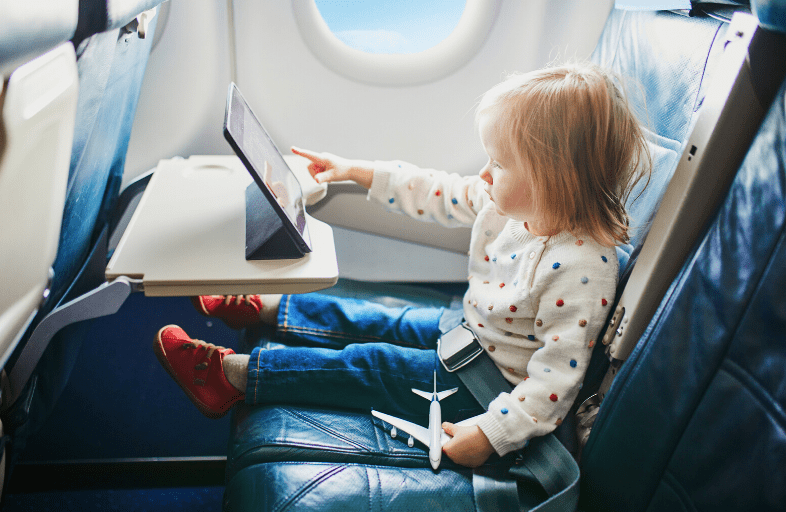

We at 7Wayfinders have been getting A LOT of questions on how to afford to travel full-time. We always respond with the same thing- we just went on the road doing exactly what we were doing before we left! We’ve owned our own business for years and were already remote. However, that isn’t the answer for everyone. In an effort to get you brainstorming and feeling empowered, I’ve asked some of my new full-time travel friends to guest post and tell you how THEY are doing it!
*Disclaimer: This post may contain affiliate links. Opinions shared are my own, and I only endorse products I support. By clicking on any of the links below, I may get a small commission if you purchase at absolutely no additional charge to you. I appreciate your support.*
Hi! We’re Ben, Kelly & Liesel and we’re a family on a one-year adventure around the world. We’re originally from Michigan, USA and recently sold our home in California to hit the “reset” button as a family and to focus on what’s important to us: making the most out of every day.
The FUNemployed Family recently wrote 3 blog posts on this topic which can be found here, here, and here. but the highlights are below!

A: We’re funding our travels mostly from the proceeds we earned selling things we won’t need to replace. The money from our house is earning interest in the bank right now, so that’s offsetting some of our expense and is super low risk! We’ve also been fortunate enough to get some great collaborations with hotels to help avoid a little bit of our lodging expenses.
Think about income in new ways!
Active income: Will your current job allow you to work remotely? If not, are you planning to leave your job? There are lots of great resources online to help you become a “digital nomad”. Upwork and Fiver are two well-known sites, but there are plenty of others. You can also teach language courses online or get paid for transcription services. The combination of options is almost endless! All you need is a laptop, reliable WiFi, and a little free time!
Passive income: This is all about making your money work for you. Are you getting interest on that savings account balance? Do you invest in the stock market? Are you renting out your house while you travel? All these options can help you offset a portion (or all) of your travel expenses!
Sell off your possessions: Purge! We know so many families who “sold it all to travel the world” (ourselves included)! Go through your home and belongings and figure out what you can live without. Sell it in a garage sale, on Craigslist, eBay, whatever works best for you. Selling big ticket items like an extra car, a boat, or RV that you just don’t really use can be really helpful here. Bonus, knowing that your things are being “upcycled” is so much better than sending them out with the trash!
Other ideas to help financially:
Points: Every time you make a purchase on a credit card, you’re most likely earning a point of value for something. Find a good travel credit card with a low (or no) annual fee to earn points toward flights or hotels. And check those hotel rewards programs and frequent flier memberships you’ve had forever! Those points accumulate and they are often forgotten about (example: we are staying in Vietnam for a week with Marriott points that we’d forgotten about)!
Use your savings: This is something I hesitate to say because everyone’s financial situation is different. We were comfortable taking a bit out of our savings because we knew our trip had an end-date, but that decision might not be right for everyone. If you’re traveling for an unspecified amount of time, it might not be best to rely on savings to fund (you’d need income to make it sustainable). That said, I would highly recommend NOT touching your retirement accounts (401k’s, IRA’s, etc). Those are sacred dollars that grow exponentially over the years, not to mention you get taxed when you take that money out!
Funding a big trip isn’t an overnight process. It takes a lot of planning! But if you are make it a priority, you CAN make it work!
A: This come down to you and your situation. Here are some things to start the budget conversation! Grab some paper and a pen, or open a spreadsheet and let’s go!
How long will you be gone? Are you planning a month, a year, forever? This is the biggest piece of the equation. It can make or break your budget, but is also the most flexible. Remember, there’s never any shame in hitting “pause” on your adventure, especially if it’s going to put you in a questionable financial position!
Where will you go? Do you want to road-trip the US, explore every village in Europe, island hop in Asia… or all of the above? Writing down all the places that you’d like to visit will help you organize your journey so that you can figure out your ideal route and research costs in each location.
How many flights will you take? Are you going to fly every week, or will you slow travel and fly once per month? When looking at flights, make sure you review all your frequent flier programs and see how you can leverage your existing points and rewards!
How much will you need for lodging? This one involves a little research. Our starting point is finding the cheapest places that will make us feel comfortable. We select a few “non-negotiable” amenities and search our target region and dates using resources like Airbnb, HomeAway, Kayak and Agoda. We use the results to get a good feel for the nightly cost of lodging in that area. Some options that could help you save big include visiting in the off-season, house-sitting, house-swapping, and camping as you travel!
What will your day to day expenses be (food, groceries, train tickets, rental cars, excursions, etc)? This is probably the hardest expense to budget because there are soooo many variables! We made ballpark estimates based on what we typically spend in day-to-day life and adjusted a bit up or down based on the cost of living in certain areas (Hawaii and Europe are generally more expensive, Asia is cheaper). Along the way, we found out about www.budgetyourtrip.com, which has been hugely helpful when researching costs of new destinations!
What costs will you still pay back home? Your house, car, cell phone plan, insurance, utilities, storage unit, etc? Are there costs you’ll need to pay when you are done traveling like a security deposit on a new apartment or new car? Luckily, this is also where you can identify some passive income. You can rent your home to cover a mortgage, rent your car, leverage your home for a house swap, and put the money in your savings account into a long-term investment to earn interest. You’ll also want to consider any tax expense or refunds that will be due as you’re traveling.
Other: The two other biggest “surprise”expenses that we’ve encountered so far are (1) Medical expenses (a couple last minute vaccinations, a chipped tooth on a sidewalk in Michigan, and a small toe injury added up quickly!) and (2) Purchasing “things” (camera upgrade, new flip flops, small birthday gifts for family, etc). Make sure you have a small allowance for unexpected expenses!
There’s no one-size-fits-all magic number for a trip around the world. By being honest and thoughtful as you enter the planning stages, you CAN figure out a budget that works for you!


Hopefully this get your juices flowing on how you might make this work for your family.
Want to see more of The FUNemployed Family?? Check them out here!
Instagram: @thefunemployedfamily
Blog: http://thefunemployedfamily.com

Check out your travel necessities from a comprehensive list of all the 7Wayfinders Travel Must-Haves. Click Here!
Find a nice hotel from Expedia, or Vrbo, (we also love Tripadvisor and Hotels.com)
Discover while having fun through exciting activities from GetYourGuide, Airbnb Experiences, or Viator
Need to rent a car to navigate the city? Visit Rentalcars.com.
Get insured while traveling with World Nomads / SafetyWing
Want to have a photo shoot while traveling? Check out flytographer!
Capture your best memories as we do with a GoPro, Sony camera, or our favorite drones: DJI FPV, Air, and Mini
Check out your travel necessities from a comprehensive list of all the 7Wayfinders Travel Must-Haves. Click Here!
Travel Tip: How To Claim a Flight Compensation In US – New Rule by 2024
30 Must-Have Tips for Flying With a Toddler
Guest Post: Living Abroad with our Bulldog.
